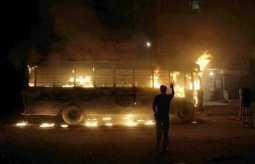Up to 46 people have been killed in the Pakistani city of Karachi after clashes broke out following the killing of a local politician, local media has reported.
More than 100 people were also said to have been injured after Raza Haider and his bodyguard were shot dead outside a mosque on Monday.
Haider's killing prompted his supporters to erect barricades in the street, and cars, restaurants and other businesses were set alight.
Karachi was tense on Tuesday with police and paramilitary troops patrolling deserted streets.
Fazal Qureshi, the chief editor of the Pakistan Press International news agency, told Al Jazeera that "all the buses have gone off the road and people aren't leaving their homes unless they really have to".
Shops and services have been closed in large areas of the city.
"Some have been closed in mourning" for the slain politician, while other shop-owners closed up in fear of rioting and destruction, Qureshi said.
'Targeted killing'
Officials described those killed in the clashes as rickshaw drivers, taxi drivers, labourers and passers-by from various ethnic groups.
But Amir Latif, the bureau chief of Online News Network, Pakistan's largest independent online wire service, told Al Jazeera that it was mostly Pashtuns who were attacked.
"There could be the involvement of any sectarian element in the killing because he [Haider] was a Shia Muslim. But the ultimate aftermath of this murder was rather ethnic," he said.
"Two ethnic groups are fighting in Karachi. They're at war with each other to establish their political domination in the city."
Haider, who belonged to the Muttahida Qaumi Movement, a partner in the Sindh provincial ruling coalition led by the Pakistan Peoples Party, was targeted by armed men on two motorcycles in the North Nazimabad neighbourhood.
"He had gone to attend a relative's funeral. Drive-by shooters attacked him near a mosque, injuring him and his guard seriously," Waqar Mallan, a police official, told the AFP news agency.
"He died on his way to hospital. It is a targeted killing."
Jameel Soomro, a spokesman for the Sindh provincial government, said the killing was a part of a broader "conspiracy".
"The country is in the grip of natural calamities and we are fighting against terrorists. At this moment, conspirators want to destabilise Karachi, which is the financial engine of Pakistan," he said.
Orders had been given to security forces to "shoot on sight miscreants involved in creating a law and order problem", Soomro said.
Taliban blamed
The government blamed the Taliban and the banned group Sipah-e-Sahaba Pakistan (SSP) for the killing of Haider.
The MQM has a strong anti-Taliban stance and the party renewed calls for a crackdown on the Sunni Muslim group after the assassination.
"For the past three to four years we have been pointing out and giving evidence about the presence of Taliban and extremists in Karachi," Wasay Jalil, a party spokesman, said.
"We were ridiculed at that time. But now everyone is admitting that the Taliban and the SSP are here."
Karachi, a city of 16 million, is plagued by ethnic and sectarian killings, crime and kidnappings.
The government has not released exact figures, but security officials say more than 125 people have been killed there since the beginning of this year.
The city is dominated by Mohajirs, Urdu-speaking people who migrated from India after Pakistan was created in 1947, but there is also a sizeable population of ethnic Pashtuns.
The MQM is generally seen as representing the Mohajirs.
PHOTO CAPTION
A policeman asked residents to stay in their homes after supporters of Muttahida Qaumi Movement (MQM) torched a bus early Tuesday morning in protest of the killing of a member of party in Karachi August 3, 2010.
Al-Jazeera


 Home
Home Discover Islam
Discover Islam Quran Recitations
Quran Recitations Lectures
Lectures
 Fatwa
Fatwa Articles
Articles Fiqh
Fiqh E-Books
E-Books Boys & Girls
Boys & Girls  Ramadan
Ramadan Fatwa Audios
Fatwa Audios Month of Mercy
Month of Mercy Women
Women Eed Al- Fitr
Eed Al- Fitr Food Recipes
Food Recipes Videos
Videos

 Prayer Times
Prayer Times












